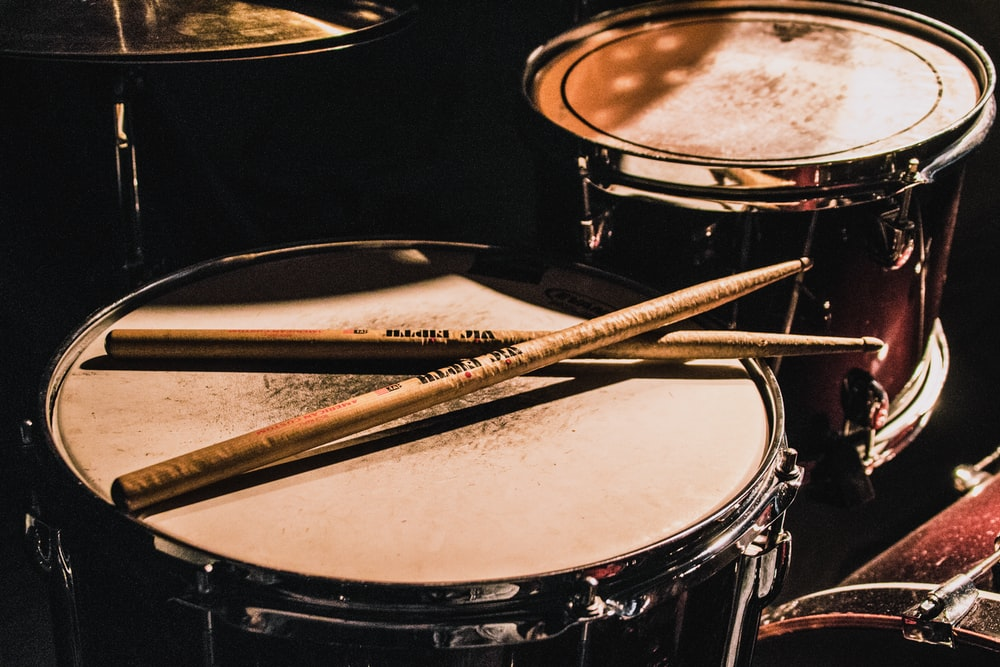If you’re a novice drummer, you’ve undoubtedly selected the greatest musical instrument available! Drums are very powerful instruments since they can be found in almost any genre of music. The drummer is relied upon the other instruments to maintain the beat and keep everyone in sync with the rhythm.
Let’s be honest about it. Playing the drums is unlike any other instrument. Exploring and playing with a wide variety of music on a drumming setup and blending them with various sorts of rhythms is a lot of fun.
Drums—What are they like?
The drum is a musical instrument made up of a round frame, and a sheet stretched over its top. This sheet is often referred to as the skin and is pulled tightly from one end to the other and held together with bolts to create a loud resonating voice.
Drummers use sticks to hit on top of the drumskin, cymbals, and hi-hats to bring variety to the sounds. The drum is often considered the essential instrument in a band because it sets the tone for all other instruments to play in sync with.
Unlike other instruments, the sound of a drum can’t be tuned to produce a different kind of music—but relies entirely on the drummer’s skills and music knowledge to play effectively.
The History of Drums
According to Historians, drums were the first musical instruments played by humans for enjoyment—particularly in Stone Age. One of the first drum setups consisted of a hard object and bamboo sticks for drum sticks. The drum set further improved in the Neolithic culture in China when people used skins from alligators as drum skin over cylindrical objects.
This also saw the evolution of hand drums. It is believed that both sticks and hand drums evolved simultaneously.
Cymbals
China also originated cymbals alongside drum sets to provide a distinct tingly sound with the drum beats. Cymbals are commonly made of metal and determine the beat intervals in a musical track. Initially, a cymbal was just a metal plate—but it has gained new attributes with better materials to resonate higher sound pitches and projection.
Tips for Playing Drums
Drum lessons for beginners can get you on the right path for learning and mastering the instrument. But, some tips can help you get a hold of the instrument quicker. Following are some of the tips for playing drums effectively:
Know Your Drum Setup
Drum kit setup is an often-overlooked part of the art of drumming. Many inexperienced drummers build their drum setups incorrectly.
It’s critical to ensure that the drums and cymbals are within easy reach. The snare drums must stay between your legs, a fraction above the knees, and the rack toms should be angled towards you.
It’s always helpful to do some research on an effective drum setup and read the setups of your favorite drummers. An adequately fixed drumming set will enable you to perform at your optimum.
Posture is Key
As necessary as it is to have a proper drum setup, it’s also crucial to maintain an excellent posture to drum effectively. For this, you need to make sure you’re sitting in the correct position, have your back hunched at just the right angle, and your legs placed appropriately. A good posture can also help in preventing injuries while playing the drums.
Lift the drum set up at the right height, so you’re not hunching too much to play the cymbals. This will make sure that your spine is in a healthy position and your lower back isn’t stressing more than it has to. Place the pedal at the natural position of your feet, with an acute angle between your legs.
Grip the Sticks Properly
Although it might not seem obvious, there are more than one ways to hold the drum sticks. One of the gripping styles is called “Matched grip” and is common among drummers around the world. This is the grip in which the drummer holds both the sticks in the same manner in either hand. The drummer wraps his fingers around the base of the sticks while the fulcrum stays between the forefinger and the thumb.
It’s vital to hold the stick with a light grip to drum more freely. The natural bounce off the drum helps drummers generate power and pace while drumming to fast beats.
Stay Consistent with Practice
A drummer is probably the most crucial part of a band due to the dynamics of sounds they can achieve and the control over beat intervals to support the base of the songs. A drummer compliments other instruments and performers, so they should stay in practice and understand the dynamics of music.
The success of a drummer is in the overall rhythm of the song. Without music knowledge, a drummer ‘can’t relay his skills and help formulate the right kind of music.
Practice Hand and Feet Coordination
One of the other top things that make a good drummer is synchronizing between hand and feet movements. Unlike other musical instruments, the drum requires the use of all the limbs of a person that he must synchronize to bring to proper use.
Modern beats require drummers to use and sync their limbs rapidly. This isn’t easy and requires robust practice. Drummers that can master the free movement of their limbs can make a promising career with drums and fit into any band relating to any musical genre out there.
Know the Basics
While being fast is a tremendous skill to possess, it doesn’t mean you can become a good drummer. Drumming is a complex procedure and must be taken step-by-step to master. Every amateur drummer’s dream is to play fast like Andrew from Whiplash. While that is an impressive attribute, it is crucial to master time management, beat judgment, and overall synchronization.
There are various ways to achieve this—one is getting help from a good music school in your vicinity and getting drum classes from an expert drummer. Following this, you need to keep practicing with dedication and patience and let your mind connect with your body in time.
About the Author
The author has been a part of international music as a solo drummer and as a part of a band. He spends his days giving drum classes to beginners and mature musicians who wish to become better drummers. Currently, he’s affiliated with The Young Musician Music Institute, one of the best music schools in Abu Dhabi that offers internationally certified music diploma classes to all aspiring musicians.












